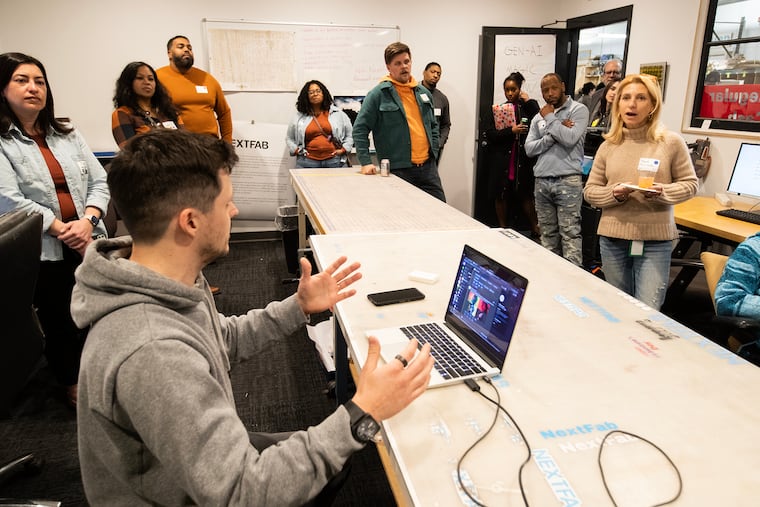NextFab’s South Philly ‘makerspace’ is closing
The company has struggled to regain members after the pandemic and is dealing with competition among other factors.

NextFab, a makerspace operator, will close its South Philadelphia location by the end of the year, as the company has struggled to regain members after the pandemic, and is dealing with competition and a shrunken market of ‘hard tech’ start-ups that focus on making a physical product.
“Downsizing is depressing,” said Evan Malone, president of NextFab in an interview with The Inquirer this week.
The organization sells members access to machinery or tools, such as 3D printers, sewing equipment, and electronics. Originally launched in 2009, the company has grown to have a location in North Philly at 1800 N. American St. and another in South Philly at 2025 Washington Ave. It had a location in Wilmington that closed last year due to the pandemic and ensuing economic conditions.
NextFab had been focused on differentiating its locations with arts and crafts activities concentrated in the North Philly location, while the South Philly location was intended to be more for the technology sector. That division was in the works when the pandemic hit, says Malone.
The space will close on Dec. 27 and operations will be consolidated in the North Philly space. Some members of the South Philly location have already said that they will relocate to the space on American Street, says Malone.
The North Philly space is 27,000 square feet and includes an area for sewing and handling textiles, a jewelry shop, and an area for laser cutting and engraving. The South Philly location is 31,000 square feet and includes a wood shop, space for 3D printing, and a metal shop.
“I went into this probably with a naive optimism most entrepreneurs have to have in order to be able to take something on that seems very new,” said Malone. “For a long time, it seemed like it was going OK. It’s been very hard to kind of come down to earth and accept that, this is just not something that we can continue anymore. The whole ship sinks or we have to jump into sort of a lifeboat — [a] smaller version of it — and continue.”
Less venture capital for start-ups
As in-person activities were limited during the pandemic, the makerspace industry took a hit, says Malone. Inflation impacted the business, as well as a shrinking market of hard tech start-ups in the region that focus on making a physical product.
“The financial markets made venture capital, sort of very risky, worse than usual, as an investment type, and so the venture capital was not available to a lot of the start-ups that we might have been working with,” he said.
There is also still ‘a kind of a brain drain’ out of Philadelphia, he says.
The organization had around 1,200 members across three locations at its height in July 2019, and now has around 500.
“We still have kind of a strong core membership base ... but it’s just not the numbers that we used to be able to support.”
On the arts and crafts business side, Malone says there’s “really good business growth in that area,” with lots of people starting passion projects during the pandemic that they wanted to turn into businesses as employment was disrupted. The organization continues to offer a program for artisans to develop their businesses, which is now supported by the Department of Commerce.
“I think we’re just starting to reach out to some of the diverse entrepreneurs that we were unable to reach before. I’m very hopeful about the partnership with the commerce department,” he said.
Brain drain and competition with other centers
The organization has around 30 employees and will reduce its staff as part of the location closure. Around 10% to 12% of the group will no longer work for the company, estimated Malone. Affected employees are receiving a severance package.
“Regrettably, we’ve had to plan for some reduction in force,” he said. “Some people have resigned because they felt like it was in the best interest of their career, as well as their interest [in] the company’s welfare.”
The closure of the South Philly location comes as NextFab has also been experiencing competition with university initiatives.
“We’re in competition against the major universities for some of what we do. We used to be more of a standout in that regard, but with Pennovation and then Drexel’s Schuylkill Yards campus, there’s a lot more capacity,” said Malone. “They’re providing to their students, and to some extent their graduates, resources that we previously were ... the main provider for in the Philly area. That’s exacerbated the problem for us as well.”
A possible new space for makers
Malone says he believes there is still appetite for the resources NextFab can provide the hard tech makers. He’s working on opening a smaller pilot space for those kinds of start-ups that could be in Center City. He aims to launch by the end of the year, but declined to share the location as he is finalizing the details.
He says it could provide a limited set of services specific to hard tech start-ups, “not like a full-fledged, well-rounded makerspace.”
Still, downsizing is hard.
“It’s the second time we’ve had to do this in two years. … So it’s painful, but on the bright side, people really value what we offer,” said Malone. ”It seems like we’re providing a valuable service, even if sometimes the market is not quite large enough to sustain us.”